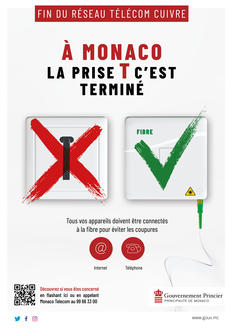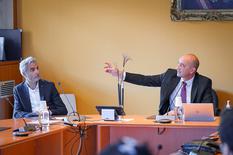- Homepage
- A Modern State
- News
- Monaco’s copper telecoms network to be switched off
Monaco’s copper telecoms network to be switched off
For over four years, the operator Monaco Telecom has been deploying the fibre broadband network across the Principality, which now enjoys 100% coverage (except in some buildings currently undergoing renovation). This is in line with the State’s strategic decision to offer a new, more efficient network capable of keeping up with rapid changes in telecoms uses.
The copper network, which until now met the Principality’s telecoms needs, was the optimal solution for landline telephony when first deployed, but advances in technology and changes in the way private individuals and business use telecommunications have altered the landscape.
The fibre network now available to users and deployed under the Principality’s digital transformation programme, Extended Monaco, will be capable of handling the volumes of traffic needed to guarantee high-performance telecommunications.
The historic copper network is becoming obsolete
Originally deployed in the 1970s, the copper network was used to install analogue phones and for the first incarnations of high-speed internet, ADSL and VDSL. Today, it provides internet to 900 of the 16,500 online households in the Principality, and some 2,300 businesses. Over 6,000 residential lines and nearly 1,550 telephone exchanges of business and administrative departments are still connected to the copper network.
For 40 years, it has provided specific services such as remote alarms for elderly persons, safety lines for elevators, point-to-point alarms for the Police Department, direct digital connections, etc.
Why shut down the copper network?
Replacing the old copper network with fibre is essential to meet the changing needs of households and businesses in the new digital world.
Copper uses technologies that have become obsolete and the equipment and infrastructure on which it is based are no longer available. As a result, there is a risk that the service provided by the operator could shut down suddenly and completely. Monaco Telecom would no longer be able to replace certain technical parts, which would inevitably malfunction.
In addition, fibre has a number of advantages, with high data transfer speeds (10 Gbps compared with 60 Mbps for copper), better stability and reliability in bad weather, and less costly maintenance. It is not only 200 times faster than copper, but much more stable and less sensitive to bad weather conditions. Once the migration is completed, the Principality will be among the most advanced countries in the world, like the Principality of Andorra which completed its transition to fibre in 2014, Jersey in 2020, Singapore and Norway which are currently making the switch, or France which will begin the process next year.
Finally, the switch to a fibre-only network is an environmentally responsible choice. It will contribute to vital efforts to manage energy consumption, since copper uses three times more energy than fibre. It is also good news for consumers’ budgets, with fibre packages costing between 13% and 42% less, for an improved service.
• Key dates and impacts for users
The switch to fibre requires on-site interventions by technicians from Monaco Telecom, to connect each home or business to the new network and to connect up the new devices used. This operation is free of charge, and has been going on successfully every day for the last two years.
Although the transition is a gradual process, the Prince’s Government and Monaco Telecom encourage households and businesses who are yet to make the switch to fibre to contact the customer service department now, to make an appointment with the operators. Various services using the copper network are set to be switched off on the following dates:
• December 2023 for consumer internet services
• July 2024 for business internet services
• December 2024 for landline telephone services
Users should contact Monaco Telecom as soon as possible in order to ensure their new fibre broadband connection is in place before the copper network is switched off.
A major information campaign by the Government is starting now, to ensure the general public are ready for the switch to fibre. Households and businesses who are directly concerned by the change will be contacted directly. In addition, there is a dedicated page on the operator’s website to help consumers find out whether they are affected by the copper switch-off (https://www.monaco-telecom.mc/arret-du-reseau-cuivre/).
For Martin Péronnet - Chief Executive of Monaco Telecom: “The key to success for this transition to fibre lies in the support provided. It is not just a project for the operator, it is a national issue, just as the introduction of the 377 country dialling code was in its time. The inevitable switch-off of the copper network should be seen as an opportunity, as it is another step towards the digitisation of our country, and addresses two important current issues, namely purchasing power and energy efficiency”.
Christophe Pierre – Director of the Digital Platforms and Resources Department: “In order for public service electronic communications to concentrate on tomorrow’s infrastructure, yesterday’s have to be switched off. The changing behaviour of the population is built around networks that are fast, stable, and fluid, which the cooper network is unable to offer. Teleworking, social connections, learning from home, or online healthcare consultations will all be made easier by fibre.”
Autres actualités du thème

Agreement signed for the transfer of historic documents from the Centre Hospitalier Princesse Grace to the National Archives

National Council President Thomas Brezzo visits the National Archives to sign a new agreement for the transfer of historic records
- The Extended Monaco digital programme
- Modernising the Administration
- Digital Security: a challenge for the future
- Assessment of public policies
- Protection of personal data
- The Administration's eco-responsibility
- The duty of remembrance
- Public finance – meeting challenges more effectively
- The Public Service
- Monaco's image










